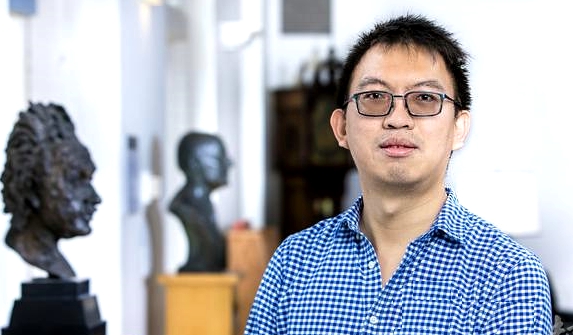
Many Malaysian astronomers had planned to come back and share their invaluable experience as astronomers, and Malaysia would have had its first major Astronomy convention, if not for the Pandemic.
Malaysia has nurtured many excellent astronomers who work at the cutting edges of astronomy all around the world. Today we have the pleasure of talking with Dr. Yuan-Sen Ting.
Dr. Ting received his Ph.D. from Harvard University and is now working at the Institute for Advanced Study in Princeton, New Jersey. He combines astrophysics and artificial intelligence to unravel the history of our own Galaxy, the Milky Way.
"Well, professor, what is a galaxy, actually?" Yuan-Sen asked a prominent professor at Oxford about ten years ago, while he was still in college. The Oxford Don was visibly perplexed by this question and thought Yuan-Sen was trying to challenge him with a seemingly simple, but philosophically profound question. Little did the professor know that his student, Yuan-Sen Ting, grew up in a country where interest in astronomy is rare. Yuan-Sen simply did not know what a galaxy is.
Fast-forward to ten years later, Yuan-Sen is now an accomplished astrophysicist, despite not knowing what a galaxy was, not too long ago. In fact, Yuan-Sen hated physics in high school (he attended the Chong Hwa Independent High School in Kuala Lumpur). Yuan-Sen always wanted to be a doctor, but he failed to get funded for the expensive medical school1. Running out of other better options, Yuan-Sen chose to pursue a degree in Science and aspired to attend medical school in the United States upon graduation.
Yuan-Sen's college years were a fascinating time for him, and not surprisingly, when he came to a fork in the road, he took it! He enrolled in two schools concurrently: the National University of Singapore (in Singapore), and École Polytechnique (in Paris, France). He finished both bachelor's and master's degrees from both schools. He attributes his success to the many amazing professors he encountered during this period, "You know, high school physics can be mind-numbing because it consists largely of calculations." Yuan-Sen added, "But physics education in college is so much more exciting. I learned math first, yes, but then the music. I learned that fundamentally physics uses the language of calculations, but describes the beauty of nature and how it operates."
When Yuan-Sen started, he was more into biophysics as part of his career plan; he aspired to apply physics into medicine. At the same time, in college, he also explored several other fields of physics, including particle physics and mathematical physics. But nothing captured Yuan-Sen's passion is like astrophysics. Like his father, an avid reader, Yuan-Sen has always been interested in a wide range of topics, within and beyond physics. To satisfy his intellectual curiosity, Yuan-Sen has always wanted to work in a field that has many facets and is intersectional. He finally found his true calling in astrophysics during his summer research project at Oxford.
"What is so unique about astrophysics, you might ask?" Astrophysicists study the properties of objects in the sky (stars, galaxies, black holes, etc.), and the ways in which they interact and influence each other. To become an astrophysicist, one would need to understand a broad range of topics. Physics is obviously a large part of astrophysics (!). Physics tells us how stars are formed and migrate. But today, modern-day astrophysics also often involves datasets of unprecedented scale. To deal with those data sets effectively, understanding computer science, machine learning (popularly called artificial intelligence) and statistics, and how to distill useful information from them, to make them intelligible to the community, are essential parts of being an astrophysicist. Finally, astrophysics also involves chemistry (because the evolution of stars leaves traces of their origins in the chemistry of the gases), as well as engineering (because telescopes are expensive, huge, and yet delicate instruments).
Inspired by the intersectional nature of astrophysics, Yuan-Sen entered graduate school at Harvard in 2012 and was conferred a Ph.D. degree in Astrophysics and Astronomy in 2017.
Since graduating, he has mostly been in the United States. Upon his graduation, he was awarded multiple top fellowships. Dr. Ting is now funded by the NASA Hubble Fellowship and is jointly affiliated with three institutions: the Institute for Advanced Study at Princeton, Princeton University, and the Carnegie Institute for Science.
Integration of physics, artificial intelligence, and statistics
Yuan-Sen jokingly said, when introducing himself, were he in a pub, he would tell people that he is an astronomer. But in more formal settings, he would tell people that he is an astrophysicist. Dr. Ting clarifies that sometimes people do not distinguish the two terms, but that's OK because both astronomer and astrophysicist actually mean the same thing.
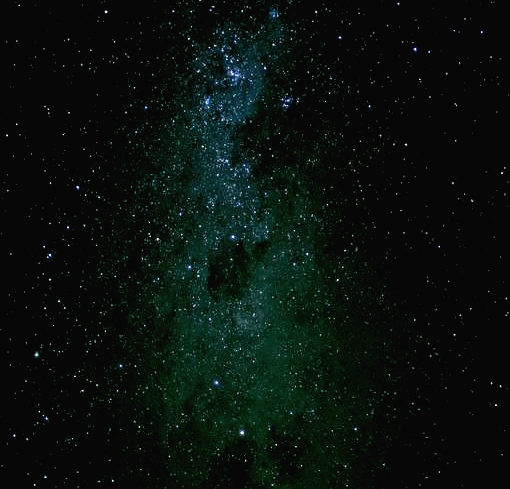
Dr. Ting works on a wide variety of problems, but his main research concerns unraveling the history of the Milky Way. He explained that the Milky Way has about a trillion stars. "You can imagine the Milky Way is like a big city, just like Kuala Lumpur. I am interested in the history of this big city, from the Big Bang until now. I wish to understand when and where the stars were formed. Are they from Petaling Jaya or Klang?2 I also want to know how many "foreigners" have migrated here, so to speak. We know that galaxies merge to form bigger galaxies, and their stars are like immigrants to this new city."
The Universe has existed for 13.8 billion years, and Yuan-Sen's research, which studies the history of the Milky Way, is also known as "Galactic Archaeology."
Dr. Ting explained that the field of Galactic Archaeology is an exciting and rising field. For four or five years now, our technology allows us to "monitor" a few billions of stars simultaneously, following what they are doing and where they are going. In the city analogy, if we have the technology to contact-trace a few billion people (most stars are long-lived, meaning that even stars that formed soon after the Big Bang would still live in "the city") we would be able to retrace the history of the Galaxy.
In terms of research techniques, his field requires three different skill-sets, "On the one hand, you would need to know physics to understand how stars work. But at the same time, we also employ artificial intelligence to distill useful information from the massive data that we are collecting. In a way, what we do is quite similar to how Facebook allocates relevant ads to you.
Facebook extracts useful information from your profile and makes certain inferences based on it. And the inference requires techniques from statistics. In short, my research operates at the intersection of physics, artificial intelligence, and statistics.
Unlike research in particle physics which often involves teams with a few hundred people, Yuan-Sen explained that astronomy research operates more autonomously. "Although there are large teams with hundreds of people, such as the team who tried to image black holes, most of the time research in astronomy can be done in teams of three to five people. On top of that, astrophysicists always pride themselves on the fact that we try to make all of our data as public and as accessible as possible. In fact, you can download now, from your own home, most of the data that I use to do my research!"
In terms of the challenges that he faced, Yuan-Sen explained that the application of artificial intelligence in astrophysics and astronomy is still in its infancy. As such, there are often debates and misunderstandings about what he is doing. There are researchers who challenge the application of AI in science and are worried about biases induced by AI. But Yuan-Sen finds such challenges very rewarding, especially with respect to seamlessly merging these two exciting fields of research. Yuan-sen often says his role is that of a translator, helping people who speak only Chinese or only English, to communicate with one other. While this study is still its early days, Yuan-Sen firmly believes that with more and more talented people joining them, such misunderstandings would eventually resolve themselves.
They are not merely astronomers, they are data scientists
It might not be immediately obvious for people who are outside the field. Most modern astronomers are experts in coding. But perhaps more importantly, they are fluent in finding patterns from big data, a skill that is highly valuable in the industry. Yuan-Sen told us that some of his graduate school friends are now working for big hedge fund firms on Wall Street, others are working in tech companies like Google. Funny enough, an old colleague of his is in the fashion industry, using big data to predict the next trendy outfit. As for himself, he said he is very much a coder during most of his working hours.
As for the Malaysian involvement in astronomy, although Yuan-Sen has not had the chance to spend more time in Malaysia, over the years, he has met many excellent Malaysian astronomers all around the world; they excel in what they do. As a matter of fact, Yuan-Sen and a few of his Malaysian astronomer friends planned to host the first Malaysian astronomy convention. They hope to attract more people in Malaysia to learn more about astronomy through the convention. But due to the current pandemic situation, the March convention had to be postponed.
Through a survey that Yuan-Sen and his friends did, there are currently about 20 Ph.D. holders in astrophysics in Malaysia, and about 15 Ph.D. holders working overseas. While this is not minuscule (30-40 Ph.D.), Yuan-Sen encourages other young people to join them.
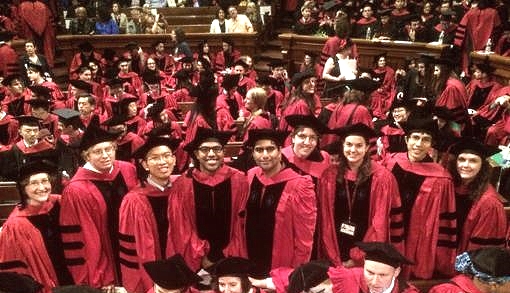
It is understandable that some people might be interested in astronomy, but they are worried about their job prospects with a degree in astrophysics. But as described earlier, Yuan-Sen said training in astronomy has many applications in industry. Through this, one can learn many useful skills in physics, computer science, and mathematics, skills that are highly valuable to industry as well as in academia.
When asked if he has any advice for people who are interested in astronomy, Dr. Ting said the core of astrophysics is still physics and mathematics. Therefore, mastering these skills is essential. With that, one can then specialize in any direction that one desires. One of his friends has always been a "handyman", and he eventually became an instrumental engineer — building big telescopes for astronomers; another friend has always been a chemist, and she is now into the chemical properties of stars. As for himself, Yuan-Sen said he always loves mathematics, and this leads him to the data analytic part of astronomy.
In fact, Yuan-Sen said, in some institutes, it is not uncommon to see philosophers. "They are answering very complementary questions. The ultimate goal of science is to answer ‘how' things work, but philosophy often helps one to clarify and better formulate the question. In fact, a student of mine was a double major in philosophy and physics in his undergraduate years. He has amazing writing skills. I bet the philosophy training has helped him tremendously in that aspect."
As for the younger folks who are still in the middle or primary schools and are interested in science. Yuan-Sen suggested that it would not hurt to read more public scientific books. While those might not help one in an exam, it motivates and inspires you to carry on; it is always useful to understand why calculus–though at times boring–is, for the most part, important.
You can understand your life backward
Yuan-Sen has many academic idols whose footsteps he aspires to follow. In particular, he said, Prof. Ken Freeman has taught him tremendously, both academically and personally.
Ken was one of the pioneers who discovered dark matter. Even though he has won many accolades, and is of an age when most professors are retired, (Freeman will be 80 in a few months) he still spends most of his time in his office. He is passionate about nurturing the younger generation of astronomers and is extremely patient with them. "He is a true idol. Not only has he moved the needle of science, but he is also just one of the most unassuming and kind people whom I know."
Ken is now a professor at the Australian National University, a place where Yuan-Sen was just awarded a tenured faculty position. If everything goes well, by the end of the year, Yuan-Sen will be working alongside his idol.
It is quite amazing to see how far Yuan-Sen has come. He hated physics in high school, but he is now an astrophysicist. He jokingly said he never plans too far ahead. Rather he just tried to be the best version of himself at the moment. "Only if you enjoy the moment, you will do things really well"
As philosopher Soren Kierkegaard (1813-1855) once said, Life can only be understood backward, but it must be lived forward. This has always been Yuan-Sen's motto. While life might not go as planned, taking one's best step at one time can often lead to new horizons that one had not dreamt of.
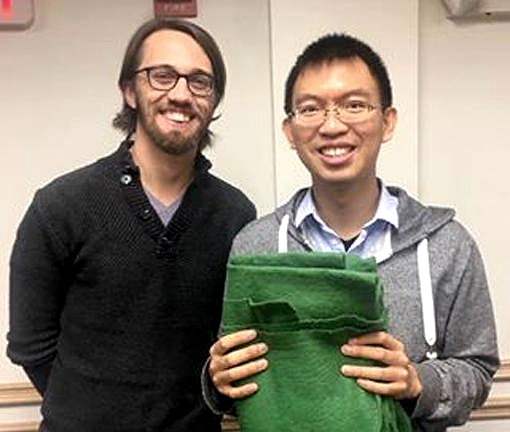
Side notes: Astronomers love to joke about sci-fi
● Astronomers are sometimes even portrayed in pop culture. For example, in the famous sitcom "The Big Bang Theory", the three main characters are physicists with their own specialties. Raj's research area resembles Yuan-Sen's the most.
● Clearly, not all movies get their science right. Often sci-fi movies that depict space science often make many funny mistakes and assumptions. Yuan-Sen and his colleagues always find that hilarious.
● Yuan-Sen made a few interesting educational videos for TED. I find those videos fascinating. One TED talk concerns measuring extreme astronomical distances in the
Universe, and another is about how one studies stars. If you are interested in astronomy and his research, you can find him on his homepage.
1 In most commonwealth countries, including Malaysia, one can study medicine in college, unlike the United States.
2 Both Petaling Jaya and Klang are satellite towns near Kuala Lumpur.
(The article first appeared on Sinchew.com.my. Translated into English by Yuan-Sen Ting and Steven Maslow.)
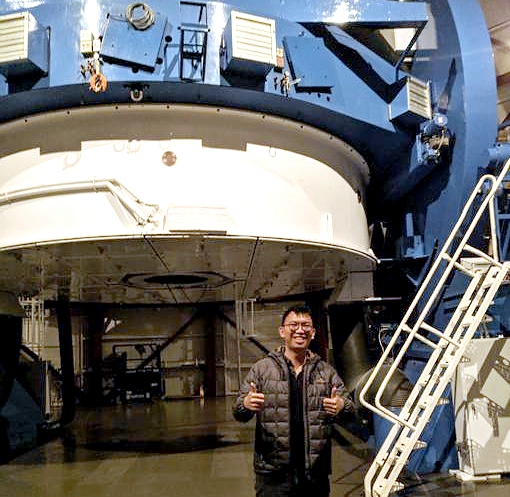
ADVERTISEMENT
ADVERTISEMENT


































